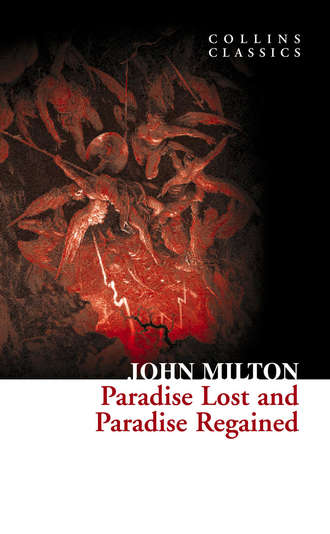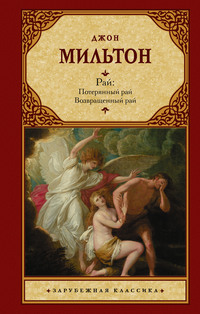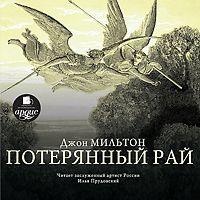
Полная версия
Paradise Lost and Paradise Regained
By that uxorious king whose heart, though large,
Beguiled by fair idolatresses, fell
To idols foul. Thammuz came next behind,
Whose annual wound in Lebanon allured
The Syrian damsels to lament his fate
In amorous ditties all a summer’s day,
While smooth Adonis from his native rock
Ran purple to the sea, supposed with blood
Of Thammuz yearly wounded: the love-tale
Infected Sion’s daughters with like heat,
Whose wanton passions in the sacred porch
Ezekiel saw, when, by the vision led,
His eye surveyed the dark idolatries
Of alienated Judah. Next came one
Who mourned in earnest, when the captive ark
Maimed his brute image, head and hands lopt off,
In his own temple, on the grunsel-edge,
Where he fell flat and shamed his worshippers:
Dagon his name, sea-monster, upward man
And downward fish; yet had his temple high
Reared in Azotus, dreaded through the coast
Of Palestine, in Gath and Ascalon,
And Accaron and Gaza’s frontier bounds.
Him followed Rimmon, whose delightful seat
Was fair Damascus, on the fertile banks
Of Abbana and Pharphar, lucid streams.
He also against the house of God was bold:
A leper once he lost, and gained a king—
Ahaz, his sottish conqueror, whom he drew
God’s altar to disparage and displace
For one of Syrian mode, whereon to burn
His odious offerings, and adore the gods
Whom he had vanquished. After these appeared
A crew who, under names of old renown—
Osiris, Isis, Orus, and their train—
With monstrous shapes and sorceries abused
Fanatic Egypt and her priests to seek
Their wandering gods disguised in brutish forms
Rather than human. Nor did Israel scape
Th’ infection, when their borrowed gold composed
The calf in Oreb; and the rebel king
Doubled that sin in Bethel and in Dan,
Likening his Maker to the grazed ox—
Jehovah, who, in one night, when he passed
From Egypt marching, equalled with one stroke
Both her first-born and all her bleating gods.
Belial came last; than whom a Spirit more lewd
Fell not from Heaven, or more gross to love
Vice for itself. To him no temple stood
Or altar smoked; yet who more oft than he
In temples and at altars, when the priest
Turns atheist, as did Eli’s sons, who filled
With lust and violence the house of God?
In courts and palaces he also reigns,
And in luxurious cities, where the noise
Of riot ascends above their loftiest towers,
And injury and outrage; and, when night
Darkens the streets, then wander forth the sons
Of Belial, flown with insolence and wine.
Witness the streets of Sodom, and that night
In Gibeah, when the hospitable door
Exposed a matron, to avoid worse rape.
These were the prime in order and in might:
The rest were long to tell; though far renowned
Th’ Ionian gods—of Javan’s issue held
Gods, yet confessed later than Heaven and Earth,
Their boasted parents;—Titan, Heaven’s first-born,
With his enormous brood, and birthright seized
By younger Saturn: he from mightier Jove,
His own and Rhea’s son, like measure found;
So Jove usurping reigned. These, first in Crete
And Ida known, thence on the snowy top
Of cold Olympus ruled the middle air,
Their highest heaven; or on the Delphian cliff,
Or in Dodona, and through all the bounds
Of Doric land; or who with Saturn old
Fled over Adria to th’ Hesperian fields,
And o’er the Celtic roamed the utmost Isles.
All these and more came flocking; but with looks
Downcast and damp; yet such wherein appeared
Obscure some glimpse of joy to have found their Chief
Not in despair, to have found themselves not lost
In loss itself; which on his countenance cast
Like doubtful hue. But he, his wonted pride
Soon recollecting, with high words, that bore
Semblance of worth, not substance, gently raised
Their fainting courage, and dispelled their fears.
Then straight commands that, at the warlike sound
Of trumpets loud and clarions, be upreared
His mighty standard. That proud honour claimed
Azazel as his right, a Cherub tall:
Who forthwith from the glittering staff unfurled
Th’ imperial ensign; which, full high advanced,
Shone like a meteor streaming to the wind,
With gems and golden lustre rich emblazed,
Seraphic arms and trophies; all the while
Sonorous metal blowing martial sounds:
At which the universal host up-sent
A shout that tore Hell’s concave, and beyond
Frighted the reign of Chaos and old Night.
All in a moment through the gloom were seen
Ten thousand banners rise into the air,
With orient colours waving: with them rose
A forest huge of spears; and thronging helms
Appeared, and serried shields in thick array
Of depth immeasurable. Anon they move
In perfect phalanx to the Dorian mood
Of flutes and soft recorders—such as raised
To height of noblest temper heroes old
Arming to battle, and instead of rage
Deliberate valour breathed, firm, and unmoved
With dread of death to flight or foul retreat;
Nor wanting power to mitigate and swage
With solemn touches troubled thoughts, and chase
Anguish and doubt and fear and sorrow and pain
From mortal or immortal minds. Thus they,
Breathing united force with fixed thought,
Moved on in silence to soft pipes that charmed
Their painful steps o’er the burnt soil. And now
Advanced in view they stand—a horrid front
Of dreadful length and dazzling arms, in guise
Of warriors old, with ordered spear and shield,
Awaiting what command their mighty Chief
Had to impose. He through the armed files
Darts his experienced eye, and soon traverse
The whole battalion views—their order due,
Their visages and stature as of gods;
Their number last he sums. And now his heart
Distends with pride, and, hardening in his strength,
Glories: for never, since created Man,
Met such embodied force as, named with these,
Could merit more than that small infantry
Warred on by cranes—though all the giant brood
Of Phlegra with th’ heroic race were joined
That fought at Thebes and Ilium, on each side
Mixed with auxiliar gods; and what resounds
In fable or romance of Uther’s son,
Begirt with British and Armoric knights;
And all who since, baptized or infidel,
Jousted in Aspramont, or Montalban,
Damasco, or Marocco, or Trebisond,
Or whom Biserta sent from Afric shore
When Charlemain with all his peerage fell
By Fontarabbia. Thus far these beyond
Compare of mortal prowess, yet observed
Their dread Commander. He, above the rest
In shape and gesture proudly eminent,
Stood like a tower. His form had yet not lost
All her original brightness, nor appeared
Less than Archangel ruined, and th’ excess
Of glory obscured: as when the sun new-risen
Looks through the horizontal misty air
Shorn of his beams, or, from behind the moon,
In dim eclipse, disastrous twilight sheds
On half the nations, and with fear of change
Perplexes monarchs. Darkened so, yet shone
Above them all th’ Archangel: but his face
Deep scars of thunder had intrenched, and care
Sat on his faded cheek, but under brows
Of dauntless courage, and considerate pride
Waiting revenge. Cruel his eye, but cast
Signs of remorse and passion, to behold
The fellows of his crime, the followers rather
(Far other once beheld in bliss), condemned
For ever now to have their lot in pain—
Millions of Spirits for his fault amerced
Of Heaven, and from eternal splendours flung
For his revolt—yet faithful how they stood,
Their glory withered; as, when heaven’s fire
Hath scathed the forest oaks or mountain pines,
With singed top their stately growth, though bare,
Stands on the blasted heath. He now prepared
To speak; whereat their doubled ranks they bend
From wing to wing, and half enclose him round
With all his peers: attention held them mute.
Thrice he assayed, and thrice, in spite of scorn,
Tears, such as Angels weep, burst forth: at last
Words interwove with sighs found out their way:—
“O myriads of immortal Spirits! O Powers
Matchless, but with th’ Almighty!—and that strife
Was not inglorious, though th’ event was dire,
As this place testifies, and this dire change,
Hateful to utter. But what power of mind,
Forseeing or presaging, from the depth
Of knowledge past or present, could have feared
How such united force of gods, how such
As stood like these, could ever know repulse?
For who can yet believe, though after loss,
That all these puissant legions, whose exile
Hath emptied Heaven, shall fail to re-ascend,
Self-raised, and repossess their native seat?
For me, be witness all the host of Heaven,
If counsels different, or danger shunned
By me, have lost our hopes. But he who reigns
Monarch in Heaven till then as one secure
Sat on his throne, upheld by old repute,
Consent or custom, and his regal state
Put forth at full, but still his strength concealed—
Which tempted our attempt, and wrought our fall.
Henceforth his might we know, and know our own,
So as not either to provoke, or dread
New war provoked: our better part remains
To work in close design, by fraud or guile,
What force effected not; that he no less
At length from us may find, who overcomes
By force hath overcome but half his foe.
Space may produce new Worlds; whereof so rife
There went a fame in Heaven that he ere long
Intended to create, and therein plant
A generation whom his choice regard
Should favour equal to the Sons of Heaven.
Thither, if but to pry, shall be perhaps
Our first eruption—thither, or elsewhere;
For this infernal pit shall never hold
Celestial Spirits in bondage, nor th’ Abyss
Long under darkness cover. But these thoughts
Full counsel must mature. Peace is despaired;
For who can think submission? War, then, war
Open or understood, must be resolved.”
He spake; and, to confirm his words, outflew
Millions of flaming swords, drawn from the thighs
Of mighty Cherubim; the sudden blaze
Far round illumined Hell. Highly they raged
Against the Highest, and fierce with grasped arms
Clashed on their sounding shields the din of war,
Hurling defiance toward the vault of Heaven.
There stood a hill not far, whose grisly top
Belched fire and rolling smoke; the rest entire
Shone with a glossy scurf—undoubted sign
That in his womb was hid metallic ore,
The work of sulphur. Thither, winged with speed,
A numerous brigade hastened: as when bands
Of pioneers, with spade and pickaxe armed,
Forerun the royal camp, to trench a field,
Or cast a rampart. Mammon led them on—
Mammon, the least erected Spirit that fell
From Heaven; for even in Heaven his looks and thoughts
Were always downward bent, admiring more
The riches of heaven’s pavement, trodden gold,
Than aught divine or holy else enjoyed
In vision beatific. By him first
Men also, and by his suggestion taught,
Ransacked the centre, and with impious hands
Rifled the bowels of their mother Earth
For treasures better hid. Soon had his crew
Opened into the hill a spacious wound,
And digged out ribs of gold. Let none admire
That riches grow in Hell; that soil may best
Deserve the precious bane. And here let those
Who boast in mortal things, and wondering tell
Of Babel, and the works of Memphian kings,
Learn how their greatest monuments of fame
And strength, and art, are easily outdone
By Spirits reprobate, and in an hour
What in an age they, with incessant toil
And hands innumerable, scarce perform.
Nigh on the plain, in many cells prepared,
That underneath had veins of liquid fire
Sluiced from the lake, a second multitude
With wondrous art founded the massy ore,
Severing each kind, and scummed the bullion-dross.
A third as soon had formed within the ground
A various mould, and from the boiling cells
By strange conveyance filled each hollow nook;
As in an organ, from one blast of wind,
To many a row of pipes the sound-board breathes.
Anon out of the earth a fabric huge
Rose like an exhalation, with the sound
Of dulcet symphonies and voices sweet—
Built like a temple, where pilasters round
Were set, and Doric pillars overlaid
With golden architrave; nor did there want
Cornice or frieze, with bossy sculptures graven;
The roof was fretted gold. Not Babylon
Nor great Alcairo such magnificence
Equalled in all their glories, to enshrine
Belus or Serapis their gods, or seat
Their kings, when Egypt with Assyria strove
In wealth and luxury. Th’ ascending pile
Stood fixed her stately height, and straight the doors,
Opening their brazen folds, discover, wide
Within, her ample spaces o’er the smooth
And level pavement: from the arched roof,
Pendent by subtle magic, many a row
Of starry lamps and blazing cressets, fed
With naptha and asphaltus, yielded light
As from a sky. The hasty multitude
Admiring entered; and the work some praise,
And some the architect. His hand was known
In Heaven by many a towered structure high,
Where sceptred Angels held their residence,
And sat as Princes, whom the supreme King
Exalted to such power, and gave to rule,
Each in his Hierarchy, the Orders bright.
Nor was his name unheard or unadored
In ancient Greece; and in Ausonian land
Men called him Mulciber; and how he fell
From Heaven they fabled, thrown by angry Jove
Sheer o’er the crystal battlements: from morn
To noon he fell, from noon to dewy eve,
A summer’s day, and with the setting sun
Dropt from the zenith, like a falling star,
On Lemnos, th’ Aegaean isle. Thus they relate,
Erring; for he with this rebellious rout
Fell long before; nor aught availed him now
To have built in Heaven high towers; nor did he scape
By all his engines, but was headlong sent,
With his industrious crew, to build in Hell.
Meanwhile the winged Heralds, by command
Of sovereign power, with awful ceremony
And trumpet’s sound, throughout the host proclaim
A solemn council forthwith to be held
At Pandemonium, the high capital
Of Satan and his peers. Their summons called
From every band and squared regiment
By place or choice the worthiest: they anon
With hundreds and with thousands trooping came
Attended. All access was thronged; the gates
And porches wide, but chief the spacious hall
(Though like a covered field, where champions bold
Wont ride in armed, and at the Soldan’s chair
Defied the best of Paynim chivalry
To mortal combat, or career with lance),
Thick swarmed, both on the ground and in the air,
Brushed with the hiss of rustling wings. As bees
In spring-time, when the Sun with Taurus rides.
Pour forth their populous youth about the hive
In clusters; they among fresh dews and flowers
Fly to and fro, or on the smoothed plank,
The suburb of their straw-built citadel,
New rubbed with balm, expatiate, and confer
Their state-affairs: so thick the airy crowd
Swarmed and were straitened; till, the signal given,
Behold a wonder! They but now who seemed
In bigness to surpass Earth’s giant sons,
Now less than smallest dwarfs, in narrow room
Throng numberless—like that pygmean race
Beyond the Indian mount; or faery elves,
Whose midnight revels, by a forest-side
Or fountain, some belated peasant sees,
Or dreams he sees, while overhead the Moon
Sits arbitress, and nearer to the Earth
Wheels her pale course: they, on their mirth and dance
Intent, with jocund music charm his ear;
At once with joy and fear his heart rebounds.
Thus incorporeal Spirits to smallest forms
Reduced their shapes immense, and were at large,
Though without number still, amidst the hall
Of that infernal court. But far within,
And in their own dimensions like themselves,
The great Seraphic Lords and Cherubim
In close recess and secret conclave sat,
A thousand demi-gods on golden seats,
Frequent and full. After short silence then,
And summons read, the great consult began.
BOOK II
High on a throne of royal state, which far
Outshone the wealth or Ormus and of Ind,
Or where the gorgeous East with richest hand
Showers on her kings barbaric pearl and gold,
Satan exalted sat, by merit raised
To that bad eminence; and, from despair
Thus high uplifted beyond hope, aspires
Beyond thus high, insatiate to pursue
Vain war with Heaven; and, by success untaught,
His proud imaginations thus displayed:—
“Powers and Dominions, Deities of Heaven!—
For, since no deep within her gulf can hold
Immortal vigour, though oppressed and fallen,
I give not Heaven for lost: from this descent
Celestial Virtues rising will appear
More glorious and more dread than from no fall,
And trust themselves to fear no second fate!—
Me though just right, and the fixed laws of Heaven,
Did first create your leader—next, free choice
With what besides in council or in fight
Hath been achieved of merit—yet this loss,
Thus far at least recovered, hath much more
Established in a safe, unenvied throne,
Yielded with full consent. The happier state
In Heaven, which follows dignity, might draw
Envy from each inferior; but who here
Will envy whom the highest place exposes
Foremost to stand against the Thunderer’s aim
Your bulwark, and condemns to greatest share
Of endless pain? Where there is, then, no good
For which to strive, no strife can grow up there
From faction: for none sure will claim in Hell
Precedence; none whose portion is so small
Of present pain that with ambitious mind
Will covet more! With this advantage, then,
To union, and firm faith, and firm accord,
More than can be in Heaven, we now return
To claim our just inheritance of old,
Surer to prosper than prosperity
Could have assured us; and by what best way,
Whether of open war or covert guile,
We now debate. Who can advise may speak.”
He ceased; and next him Moloch, sceptred king,
Stood up—the strongest and the fiercest Spirit
That fought in Heaven, now fiercer by despair.
His trust was with th’ Eternal to be deemed
Equal in strength, and rather than be less
Cared not to be at all; with that care lost
Went all his fear: of God, or Hell, or worse,
He recked not, and these words thereafter spake:—
“My sentence is for open war. Of wiles,
More unexpert, I boast not: them let those
Contrive who need, or when they need; not now.
For, while they sit contriving, shall the rest—
Millions that stand in arms, and longing wait
The signal to ascend—sit lingering here,
Heaven’s fugitives, and for their dwelling-place
Accept this dark opprobrious den of shame,
The prison of his tyranny who reigns
By our delay? No! let us rather choose,
Armed with Hell-flames and fury, all at once
O’er Heaven’s high towers to force resistless way,
Turning our tortures into horrid arms
Against the Torturer; when, to meet the noise
Of his almighty engine, he shall hear
Infernal thunder, and, for lightning, see
Black fire and horror shot with equal rage
Among his Angels, and his throne itself
Mixed with Tartarean sulphur and strange fire,
His own invented torments. But perhaps
The way seems difficult, and steep to scale
With upright wing against a higher foe!
Let such bethink them, if the sleepy drench
Of that forgetful lake benumb not still,
That in our proper motion we ascend
Up to our native seat; descent and fall
To us is adverse. Who but felt of late,
When the fierce foe hung on our broken rear
Insulting, and pursued us through the Deep,
With what compulsion and laborious flight
We sunk thus low? Th’ ascent is easy, then;
Th’ event is feared! Should we again provoke
Our stronger, some worse way his wrath may find
To our destruction, if there be in Hell
Fear to be worse destroyed! What can be worse
Than to dwell here, driven out from bliss, condemned
In this abhorred deep to utter woe!
Where pain of unextinguishable fire
Must exercise us without hope of end
The vassals of his anger, when the scourge
Inexorably, and the torturing hour,
Calls us to penance? More destroyed than thus,
We should be quite abolished, and expire.
What fear we then? what doubt we to incense
His utmost ire? which, to the height enraged,
Will either quite consume us, and reduce
To nothing this essential—happier far
Than miserable to have eternal being!—
Or, if our substance be indeed divine,
And cannot cease to be, we are at worst
On this side nothing; and by proof we feel
Our power sufficient to disturb his Heaven,
And with perpetual inroads to alarm,
Though inaccessible, his fatal throne:
Which, if not victory, is yet revenge.”
He ended frowning, and his look denounced
Desperate revenge, and battle dangerous
To less than gods. On th’ other side up rose
Belial, in act more graceful and humane.
A fairer person lost not Heaven; he seemed
For dignity composed, and high exploit.
But all was false and hollow; though his tongue
Dropped manna, and could make the worse appear
The better reason, to perplex and dash
Maturest counsels: for his thoughts were low—









